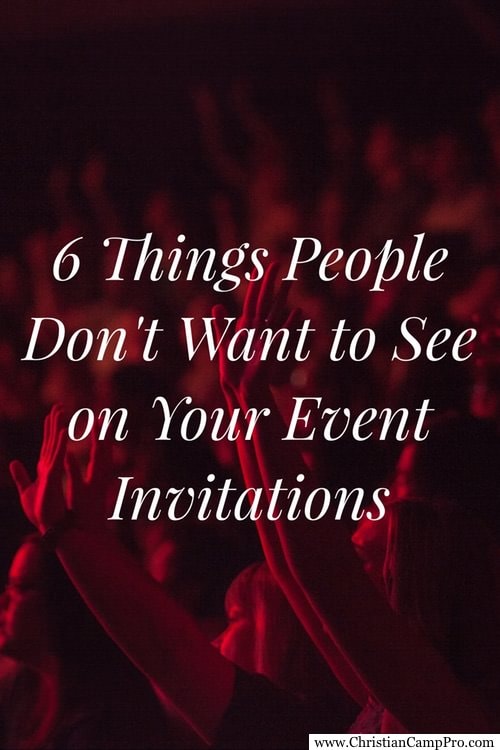We all know a good event invitation when we see one. Good invitations set a mood. They draw people in and cause an air of excitement. They convey a sense of mystery about what to expect.

But what about bad event invitations? Here are 6 surefire signs of a terrible invite:
Table of Contents
For starters, bad design.
17 fonts. Color combos that make you wince. One thousand lines of text. No clear call-to-action. Yikes.
It’s easy to remedy this. If you’re not a designer, consider starting with a pre-made template on a DIY event site maker like Splash. Find gorgeous (royalty-free) images on sites like Unsplash or Gratisography. And throw in cool GIFs with Veed.io if you’re feeling extra daring. (Or make your own using GIPHY’s GIF Maker tool.)
Also remember: consistency is key. We’ve found that invitations are 15 times more likely to get accepted if they have a steady design and color scheme.
Desperation reeks. Even on a screen.
Your invitation shouldn’t read like a door-to-door salesman pitch. Avoid spammy, clickbaity or pushy language in your headlines, and remember that less is more. Tests show that 45% of emails are opened on a mobile device first, where the average mobile screen can only fit 4-7 words maximum. So keep your subject lines to 30 or fewer characters and let the event speak for itself. You don’t need to oversell it.
It’s an invitation – not a memoir.
A truly great invitation reveals; it doesn’t tell, it doesn’t ramble, and it doesn’t instruct. If you have additional information you want to communicate, stick to concise language and save all the nitty-gritty details for the FAQ section of your event page.
The power of a typo.
A typo in someone’s name? Embarrassing. A typo in a location or an address? Downright confusing. The bottom line is, spelling mistakes convey carelessness.
Plus, it leads to broken links, or worse – accidentally sending out emails that were never meant to be sent. According to one study, a single spelling mistake turned off 70% of email respondents from every age demographic.
So double (and triple!) check your invitations. Have a copy editor look over them. Though it may seem time-consuming and tedious, a little proofreading goes a long way.
It’s all in the details.
It may come as a surprise, but we’re often not as clear as we think. Vague, foggy language may limit the number of acceptances you receive and, worse, it can come off as pretentious.
Remember to add in key, concise details, like an apartment number, a map if your event is in a remote location, or an event password if you’re going speakeasy-style.
Anything you find that’s crucial to getting your guests to arrive as smoothly as possible – make sure it’s in there.
Too many reminders.
People are busy. They can get lost in their own schedules and forget to respond to something. It doesn’t necessarily mean they don’t want to attend your event.
A follow-up message works wonders for getting in those final responses. Research shows that you should wait up to 4-7 days before sending out the first one.
However, there’s definitely a fine line between reminding someone and going overboard. One or two reminders should be just enough to do the trick.
Ben Hindman is the co-founder and CEO of Splash, an event marketing platform that helps event planners make their events look as amazing online as they do in person.